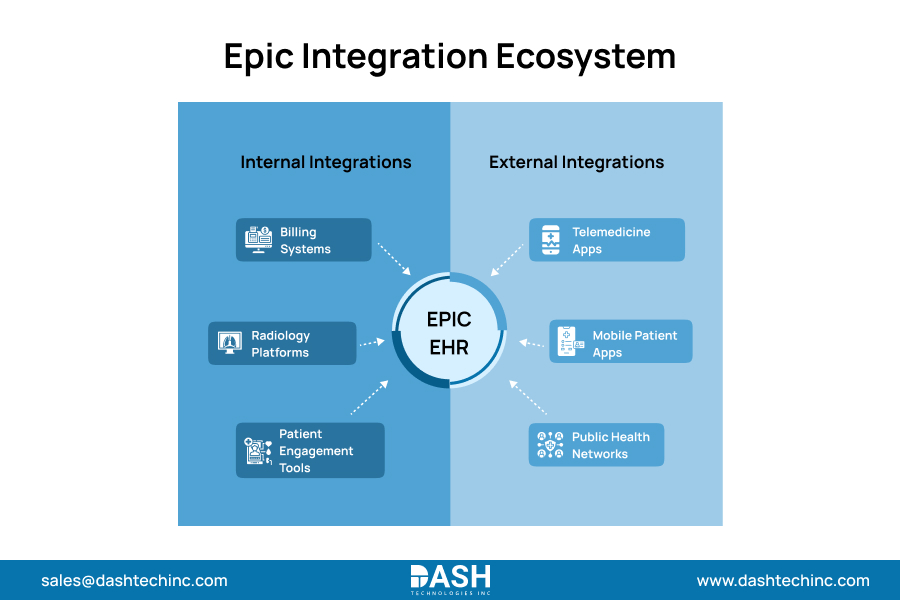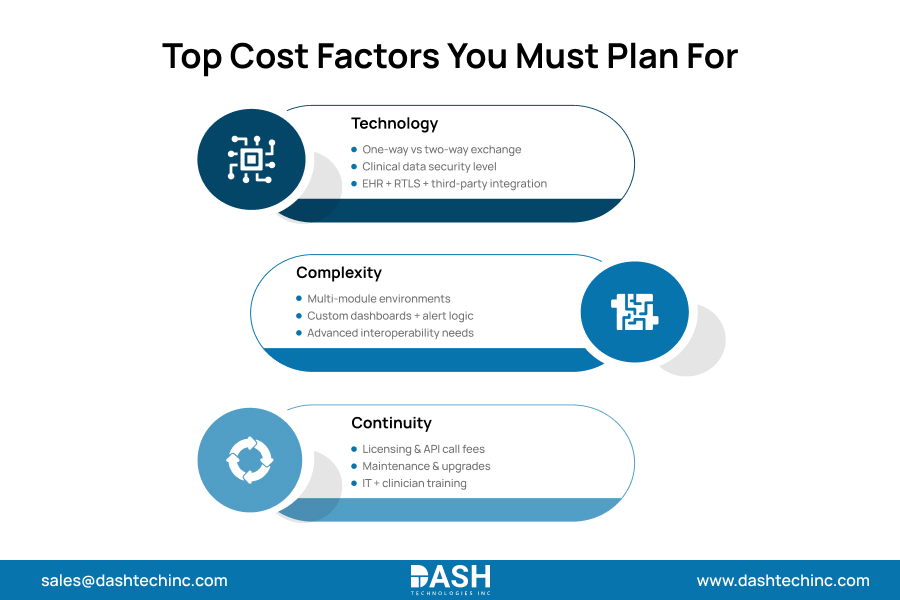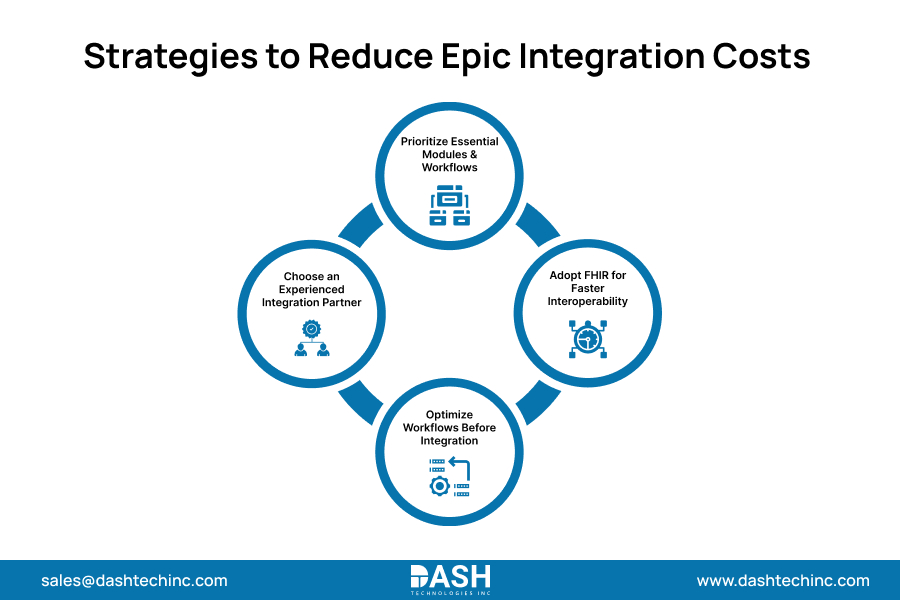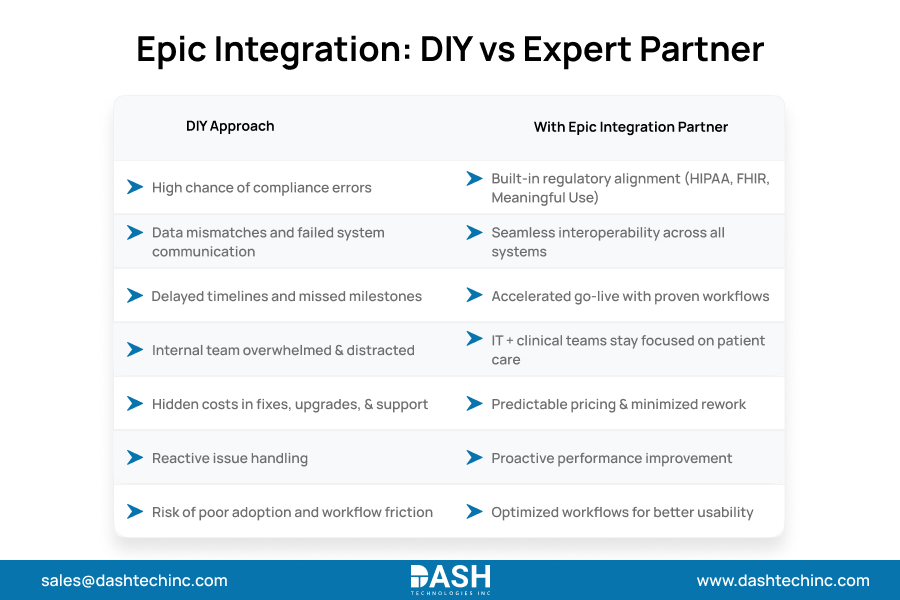Epic Integration Costs : Complete 2025 Budget Guide
Epic integration is the top choice for organizations seeking smooth clinical workflows and improved patient care. And for most healthcare decision makers, there is one question that still reigns supreme: How much does Epic EHR cost in 2025? You’ve come to the right place to get that answer! With the rapid growth of Epic EHR in clinics & hospitals, it’s vital to understand your total costs. This includes more than just the software.
Integration costs this year vary widely. Small clinics start at about $1,200. In contrast, enterprise hospitals spend over $10 million. These epic integration costs depend on scale, complexity, and the chosen methods. Planning an Epic rollout or upgrade? A clear budget breakdown will help you manage every expense and surprise.
Let’s explore what really drives these costs and how the right Epic EHR integration company can help you budget smarter for a seamless, future-ready implementation.
Understanding Epic EHR Integration

Epic EHR integration ensures efficient data exchange between Epic’s electronic health record system and other software solutions. As an epic EHR integration company, we connect organizations with both internal tools and external services, driving better workflows and outcomes.
Internal vs. External Integration
Internal Integration
Epic EHR can connect well with your in-house billing software. This allows for real-time financial tracking. It also links to radiology platforms for instant imaging results. Additionally, it works with patient engagement tools for easy communication. This setup keeps clinical and financial data in one secure system. It’s crucial for quick decision-making and clear operations.
External Integration
Epic integration services connect Epic with telemedicine apps, mobile patient apps, and public health platforms. This allows users to access their records, schedule appointments, and receive reminders. As a result, virtual care and reporting become seamless.
Data Exchange Platforms
Epic’s Care Everywhere – Interoperability network functions as a Health Information Exchange (HIE) capable of handling more than 20 million daily record exchanges.
Common Integration Methods
Epic integration companies offer three main ways to connect systems:
API-Based Integration (Cost-Efficient)
This uses Epic’s standardized APIs, like FHIR and USCDI, for quick, affordable, and secure system connections. It’s perfect for simple use cases and easy growth.
Custom Development (Highly Tailored but Costly)
Custom interfaces are built for unique workflows or legacy systems. These integrations offer deep customization, robust performance, and flexibility, but can demand a higher investment for development hours and ongoing support.
Middleware Solutions (Balanced Flexibility and Cost)
Middleware tools act as bridges between Epic and diverse platforms, allowing organizations to mix and match compatible systems without a major overhaul. These offer a practical balance, often chosen for medium complexity projects.
Cut Epic Integration Costs by 20%
Your early integration decisions drive total Epic costs. We guide you to the most efficient architecture to streamline workflows and prevent expensive rework.
Talk to Our TeamChoosing the right method early on can help lower the total Epic EHR implementation cost by up to 20%.
Key Factors Influencing the Cost of Epic EHR Integration
It’s critical to understand the cost to implement Epic EHR in 2025 and the factors to consider when planning your Epic EHR implementation. Understanding these elements enables precise budget forecasting and informed decision-making. Below is an organized overview of the main considerations affecting Epic EMR pricing to help prevent unexpected financial surprises during your 2025 rollout.
Type and Scope of Integration
One-way vs. Two-way Data Flow
One-way data exchange, like exporting patients or billing info from Epic, usually costs less. In contrast, two-way integration allows seamless data to push and be retrieved across systems. This type demands more resources and may incur extra Epic EMR pricing tiers and vendor fees. Epic enables free one-way data synchronization through its USCDI API but requires payment for two-way Search and Create features.
Number of Systems and Modules Involved
Combining Epic EHR with several healthcare modules, such as billing, lab, radiology, and telemedicine—makes things more complex and boosts costs. A single-system implementation will be much cheaper than a multi-module rollout.
Type of Data Exchanged
Whether you’re transferring clinical, administrative, or patient data, more sensitive or regulated types of information may require additional compliance and development costs, increasing the overall cost of Epic EHR implementation.

Customization and Workflow Requirements
- Custom integrations require adaptation for specific workflows, which include creating tailored templates and dashboards.
- Adhering to regulations such as HIPAA and Meaningful Use standards represents a compliance requirement.
Development Time and Resources
- Hiring costs increase when hiring developers, project managers, & consultants specializing in Epic systems.
- The project timeline extends to include design, development, testing, and deployment stages.
Ongoing Maintenance and Support
- Ongoing maintenance usually costs 15–20% of the initial setup each year.
- Training costs for Epic systems are often ignored, but they matter. They help maximize ROI and prevent disruptions.
- Keep your Epic system running smoothly by considering:
- Updates
- Regulatory changes
- Troubleshooting
- Ongoing training for clinicians and IT staff
Licensing and Subscription Fees
- Epic’s USCDI API provides many basic features at no cost, but organizations may incur expenses for extra features & third-party tools to finish all their Epic EHR integration needs.
- Hidden costs from middleware add-ons, API call volume surcharges, and integration with third-party healthcare apps.
All these factors affecting the total cost of an Epic EHR integration show why careful planning is extremely essential.
How Much Does Epic EHR Integration Cost in 2025?
If you’re searching for a precise answer to “how much does Epic EHR cost,” it’s important to recognize that Epic EHR pricing varies widely based on deployment method, organization size, and scope of integration. Below is a detailed breakdown to help estimate how much does Epic costs per year and over the lifecycle of your system.
Licensing and Subscription Models
Epic offers both self-hosted licensing and cloud-based subscription models—each with different cost structures.

Implementation and Infrastructure Requirements
Implementation demands substantial infrastructure investment beyond acquiring software licenses:
- Software installation: $2-10 million for large-scale hospital projects.
- Hardware & infrastructure: $2-10 million for on-premises deployments.
- Data migration: Implementation costs for data migration range between $1 and $5 million, depending on the complexity of legacy systems and the volume of data.
Organizations can reduce initial hardware costs through cloud-based deployments at the expense of monthly operational fees.
Hidden Costs and Ongoing Expenses
Total cost of ownership includes numerous hidden expenses that have a substantial impact:
- Training: $2-10 million initially for larger health systems, with ongoing costs for new staff
- Maintenance and upgrades: Approximately 20% of initial licensing annually
- Support staffing: $150,000-$500,000 annually for dedicated IT teams
- Workflow Optimization & Customization: Can add substantial, variable costs over time
The Total Cost of Ownership (TCO) should be visualized as a combination of initial Epic EHR pricing, yearly fees, hidden maintenance, and staff support, demonstrating that successful Epic EHR implementation is a multi-year investment.
Healthcare organizations that understand these factors can create precise financial plans for their Epic EHR integration & find ways to enhance their investment return while preserving system performance & care quality.
Cost-Saving Strategies for Epic EHR Implementation

Reducing Epic EHR costs is possible with strategic planning and the right partnerships. Here are some effective ways to make your Epic system deployment faster and save money:
Begin with a Scalable Integration Scope
Avoid unnecessary upfront expenses by targeting essential workflows first. Integrate core patient, billing, or clinical systems, then expand your Epic EHR integration as your organization grows. This phased approach helps reduce Epic EHR cost and ensures long-term flexibility.
Leverage FHIR APIs to Lower Development Costs
FHIR (Fast Healthcare Interoperability Resources) APIs offer modern, standardized data exchange, minimizing the custom coding requirements & simplifying Epic EHR integration. Using FHIR-based solutions often accelerates timelines and curbs expensive development hours.
Optimize Workflows Before Integration
Don’t go charging into Epic while your processes are still in complete chaos. That’s a terrible move. Invest time now in examining how your facility truly operates. Where are bottlenecks happening? Which procedures need to be modernized? Address those problems upfront, and you’ll avoid expensive customization when integration begins.
Partner with the Best Epic EHR Integration Company
Apply these strategies & you’ll accomplish far more than reducing Epic EHR implementation costs; you’ll construct something durable that delivers genuine value. Final advice? Don’t shortchange expertise. Partner with the best Epic EHR implementation partner and hire top Epic EHR consultants who truly master their craft. Your healthcare transformation matters too much to risk.
Why Work with an Epic EHR Integration Partner
Choosing the right Epic EHR integration company is more than a technical decision; it’s a strategic investment in your organization’s long-term performance and financial health.
The Reality of DIY Integrations
Many hospitals believe they’ll cut costs by assigning the Epic EHR integration to their current IT team. Yet, the path is fraught with hidden challenges:
Compliance Errors: Healthcare regulations often form a complex maze. When your staff tries tackling it alone, you wind up facing violations that eat up your budget and attract unwanted regulatory attention.
Data Mismatches: Your IT team slams into obstacles constantly. Systems speak incompatible languages, creating data silos. File transfers stop midway & platforms refuse to communicate. Frustration builds & schedules slip further behind.
Extended Timelines: Without special skills, projects often miss deadlines, slow productivity, and delaying benefits.
High Maintenance Costs: DIY methods often result in higher ongoing costs. This includes troubleshooting, unexpected upgrades, and support.

The Advantage of an Integration Partner
Hiring Epic integration experts, such as a proven Epic EHR integration partner, delivers measurable advantages:
Accelerated Go-Live Timelines: Experienced professionals help your organization use Epic more quickly.
Seamless Interoperability: Professional Epic integrators optimize and verify interoperability with all platforms and systems connected to Epic, leaving no gaps in your patient information pipeline.
Regulatory Compliance: From HIPAA to FHIR and also Meaningful Use, your organization and patients are safe from day one.
Cost Predictability & Performance Assurance: Integration companies provide detailed estimates up front and guarantee quality results, minimizing financial risk.
That’s when working with an experienced Epic EHR integration company like Dash Technologies makes the difference. Hire Epic integration experts like us to help your staff concentrate on patient care, while we manage the technical challenges.
Your Next Step Toward Seamless Epic EHR Integration
With over 14 years of healthcare IT experience, Dash Technologies has built a proven track record delivering advanced interoperability and digital transformation for providers, MedTech firms, and diagnostic organizations worldwide.
Pick any best Epic EHR integration company list, and you’ll probably find us on it. Why? Because we actually know what we’re doing with HL7 and FHIR standards and a history of successful, compliant integrations. We specialize in streamlining even the most complex Epic EHR integration services, ensuring your systems connect efficiently and securely.
- Reduce integration and maintenance costs
- Speed up implementation timelines
- Ensure end-to-end compliance and reliability
- Optimize data flow for better patient care
Ready to simplify Epic integration and cut unnecessary costs? Let’s build your connected healthcare ecosystem together. Talk to our Epic Integration Experts.
About Dash

Dash Technologies Inc.
We’re technology experts with a passion for bringing concepts to life. By leveraging a unique, consultative process and an agile development approach, we translate business challenges into technology solutions Get in touch.







